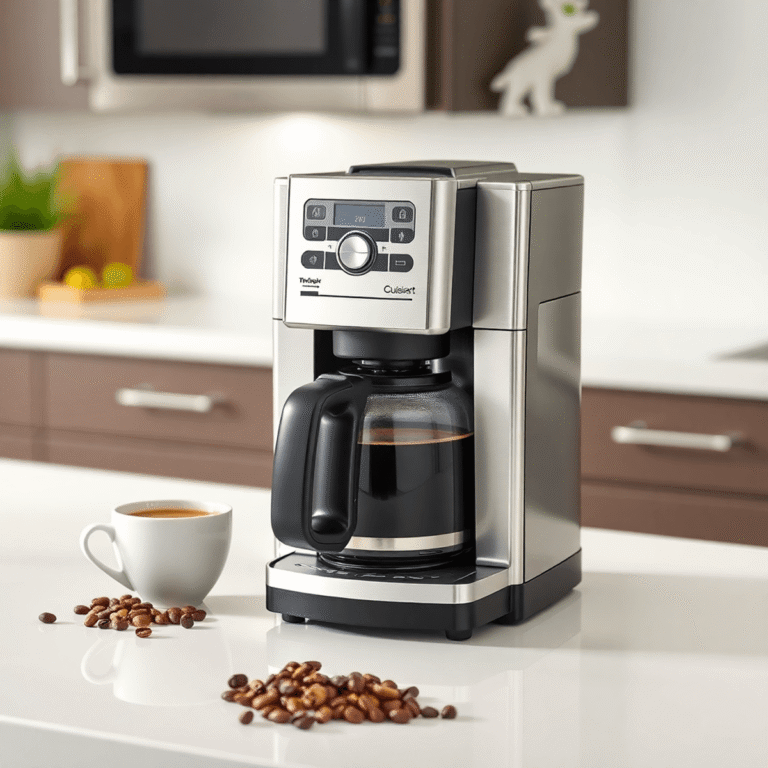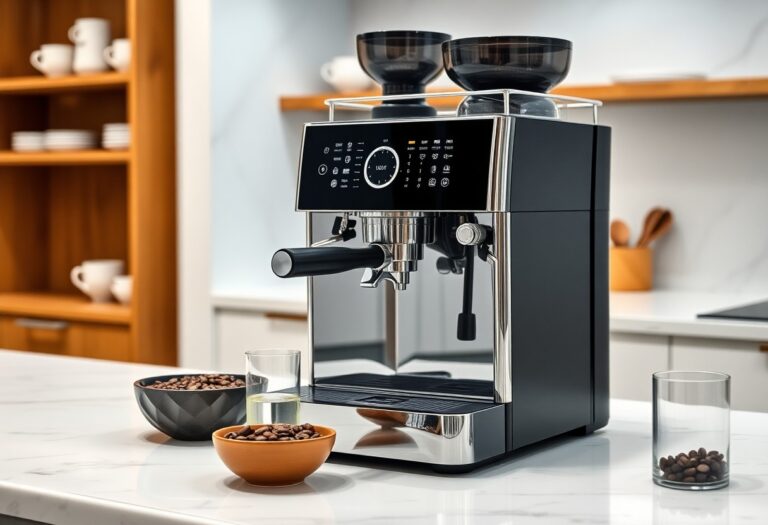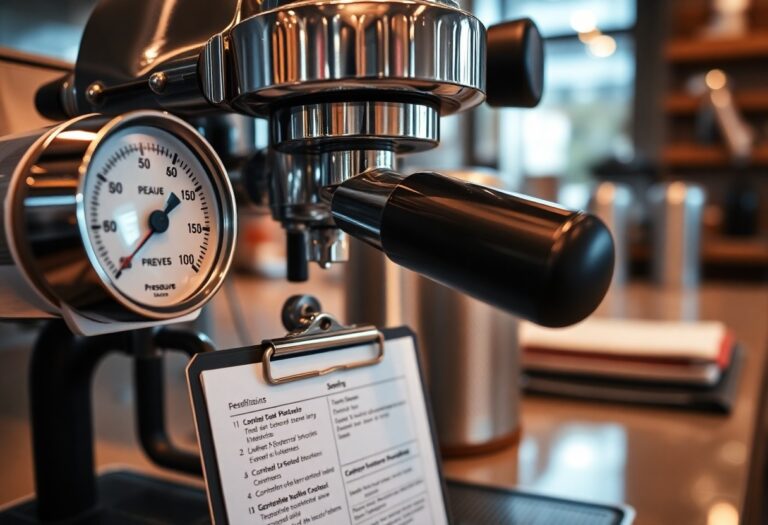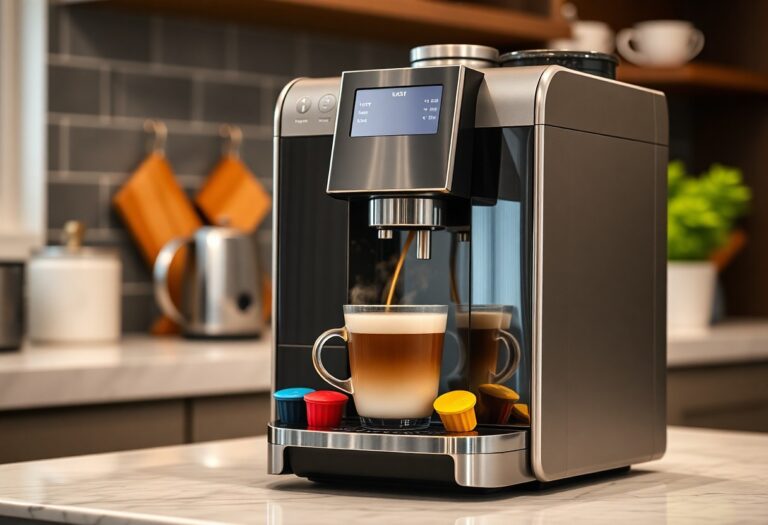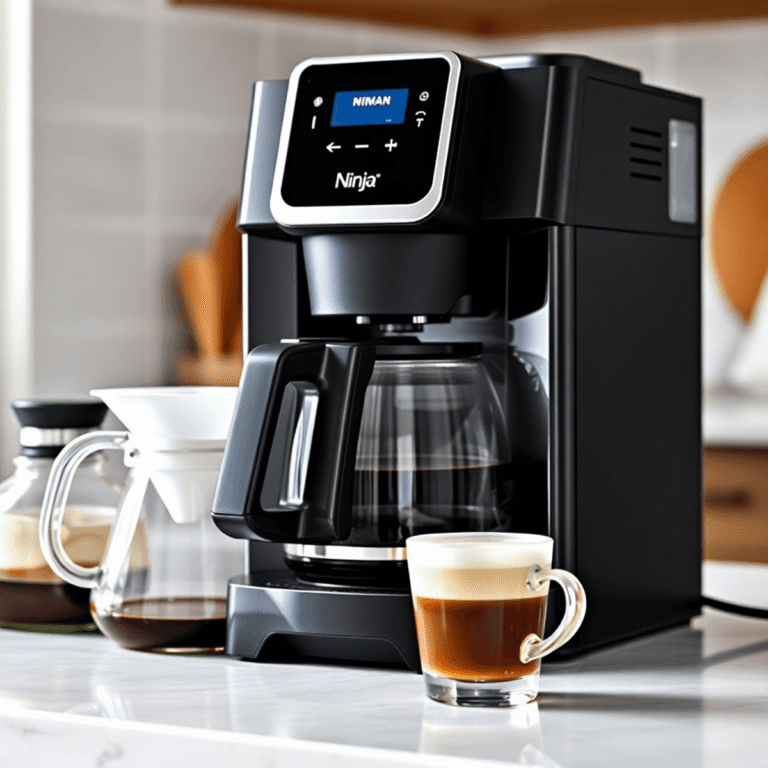What is the Best Coffee Machine for a Coffee Shop – Commercial Grade
Coffee lovers know that a high-quality machine can set your coffee shop apart. When choosing the best commercial grade coffee machine, consider factors like performance, durability, and capacity to meet your customers’ demands. Making an informed choice means investing in reliable equipment that can withstand daily use while delivering exceptional coffee. For a deeper investigate equipment options, check out The Best Espresso Machine. Your choice will impact both your sales and customer satisfaction.
Key Takeaways:
- Evaluating coffee machines should include factors like brew speed, capacity, and the variety of beverages they can produce to meet customer demand.
- Look for machines that offer consistent temperature control to ensure optimal extraction of flavors and maintain quality in every cup.
- Consider the level of maintenance required and the availability of professional support to minimize downtime in your coffee shop.
- Investing in a machine that allows customization—through programmable settings or attached grinders—can enhance customer experience by providing tailored options.
- Assessing the overall footprint and design of a coffee machine is imperative to ensure it fits seamlessly into your shop’s layout and workflow.
Decoding Coffee Demand: What Your Shop Really Needs
Understanding the specific coffee demand of your shop involves thorough analysis of customer preferences and the efficiency of your operations. Identifying the right blend of equipment and service speed can significantly elevate your customer experience and influence repeat business. Knowing how many drinks you’ll serve during peak hours can make all the difference, guiding your decisions on commercial-grade equipment and the training of your baristas to ensure a seamless flow of operations. Thou must not overlook these foundational aspects.
Customer Preferences: Factors to Consider
Your customers’ preferences are pivotal in deciding the type of coffee machine you require. Factors include the types of beverages they enjoy—espresso, drip coffee, or specialty drinks—as well as their taste profiles. You might also explore whether they prefer locally-sourced beans, organic options, or specific brewing styles, as each choice affects your equipment needs. Regular feedback and surveys can help you stay in tune with evolving tastes and allow you to pivot accordingly, thus retaining customer loyalty.
- Type of beverages
- Taste profiles
- Locally-sourced or organic options
- Brewing styles
Volume and Speed: The Heartbeat of Your Operations
The volume of coffee your shop serves directly influences the selection of your machine and operational workflow. An ideal machine should handle high volume efficiently while maintaining exceptional quality. If your establishment serves hundreds of cups during busy hours, look for machines capable of producing multiple beverages simultaneously without compromising the flavor or consistency. A dual boiler system, for instance, allows for simultaneous brewing and steaming, significantly increasing your service speed and reducing wait times for customers. Taking note of your busiest times will enable you to invest wisely in the right equipment tailored to meet the demand.

Torque and Temperature: Key Features in Commercial Machines
Selecting a commercial coffee machine means prioritizing key features like torque and temperature. These elements directly influence the coffee quality, machine efficiency, and maintenance requirements. Machines that offer higher torque provide better pre-infusion and pressure consistency, while precise temperature controls ensure optimal extraction of flavors.
- Torque Control: Allows for consistent coffee extraction.
- Temperature Precision: Maintains ideal brewing temperatures.
- Stability: Reduces temperature fluctuations during operation.
- Heat Retention: Essential for maintaining brew quality.
- Steam Power: Sufficient torque produces better milk frothing.
Key Features
| Feature | Description |
|---|---|
| Torque Control | Ensures consistent extraction regardless of barista technique. |
| Temperature Management | Critical for achieving desirable flavor profiles. |
This focus on torque and temperature management not only improves your coffee but also contributes to overall customer satisfaction.
Boiler Systems: Single vs. Dual vs. Heat Exchange
Deciding between single, dual, or heat exchange boiler systems impacts brewing efficiency and temperature stability. Single boilers heat water and steam sequentially, making it less suitable for busy shops needing simultaneous functions. Dual boilers allow for independent brewing and steaming temperatures, providing versatility. Heat exchange systems maintain an optimal temperature for brewing while allowing quick access to steam, offering a good balance between efficiency and flexibility for high-volume environments.
Boiler Systems Comparison
| Boiler Type | Description |
|---|---|
| Single Boiler | Good for small volumes; sequential heating. |
| Dual Boiler | Preferred for high-performance; independent controls. |
| Heat Exchange | Efficient for both brewing and steaming. |
Temperature Consistency: The Science of Extraction
Temperature consistency plays a pivotal role in coffee extraction. Fluctuating temperatures can lead to uneven extraction, resulting in bitter or under-extracted shots. A precise temperature control system minimizes variability and ensures that every cup meets high-quality standards. Investing in a machine with advanced temperature management technology enables you to harness the full spectrum of coffee flavors.
Temperature Consistency Details
| Aspect | Impact on Coffee |
|---|---|
| Temperature Fluctuations | Leads to inconsistent flavor profiles. |
| Electronic Temperature Control | Provides precise adjustments for ideal brewing. |
| Pre-Infusion Technique | Helps in developing deeper flavors. |
Thus, understanding the nuances of temperature consistency and boiler systems is important for maximizing flavor and ensuring operational efficiency. Your choice of equipment directly influences the quality of the coffee served and the overall success of your coffee shop.
Brand Reliability: Which Names Stand the Test of Time?
In the competitive coffee shop landscape, brand reliability plays a significant role in your equipment choices. Established names like La Marzocco, Synesso, and Rancilio have built a reputation for both quality and longevity. These brands often outlast their competitors due to their commitment to performance and customer satisfaction. Investing in a trusted brand not only ensures a solid machine but also an enduring relationship with your equipment, minimizing unexpected downtimes.
Industry Giants vs. Emerging Innovators
Both industry giants and emerging brands have unique offerings that cater to various customer needs. While giants provide reliability and proven performance, innovative newcomers often introduce advanced features and sustainability practices. Brands like Breville and Nuova Simonelli exemplify how established players continue to evolve, while trailblazers like Fetco and Laranzano capture the market with their unique coffee solutions and designs. Your selection should align with your shop’s identity and customer preferences.
Customer Support and Warranty: Don’t Overlook
Quality customer support and a robust warranty are important aspects of your coffee machine choice. In a busy coffee shop, maintaining uninterrupted service is paramount, and dependable support can significantly minimize downtime. Machines come with warranties ranging from one year to as much as five years, covering parts and labor. Brands with a solid service network help ensure you won’t be left stranded in a crisis, providing peace of mind and operational stability in a demanding environment.
Choosing a machine that includes extensive customer support and a comprehensive warranty can save you from significant costs down the line. Consider the responsiveness of the service team and the availability of replacement parts when assessing brands; a company that prioritizes service means quicker repairs and reduced time without your important equipment. Moreover, some companies offer training for your staff to operate and troubleshoot the machines effectively, further enhancing your operational efficiency and coffee quality.

Cost vs. Value: Making an Informed Investment
A coffee machine represents a significant investment for your shop, and understanding the balance of cost versus value can impact your bottom line. Opting for the cheapest model may save you money upfront but can lead to more frequent breakdowns, lower-quality brews, and ultimately dissatisfied customers. On the other hand, investing in a high-quality, reliable machine may require a higher initial expenditure but can enhance your customer experience, efficiency, and lead to increased profits in the long run.
Upfront Costs vs. Long-term Operational Expenses
Your choice of a coffee machine has immediate financial implications, including the purchase price and installation. However, long-term operational expenses like maintenance, repairs, and energy consumption can substantially affect your overall investment. A high-quality commercial machine might cost more initially but often translates to lower repair bills and energy costs, leading to greater savings and profits as time goes on.
The ROI of Quality Equipment in a Competitive Market
Investing in quality equipment can significantly boost your return on investment (ROI), particularly in a saturated market. Customers are willing to pay a premium for well-crafted beverages made by reliable machines, which can set your coffee shop apart. Quality machines lead to better consistency, enhancing customer satisfaction and loyalty, ultimately driving sales and profits.
In a competitive landscape, the ROI of quality equipment becomes evident through increased customer retention and the ability to command higher prices for premium beverages. For instance, studies show that shops using high-end espresso machines can see a 20-30% increase in sales due to improved flavor and consistency. Additionally, satisfied customers are likely to share their positive experiences, driving new patronage and offering a vital edge in attracting a dedicated customer base.
Essential Accessories and Add-ons for Success
A high-quality coffee machine isn’t the only tool for your coffee shop’s success. Investing in crucial accessories and add-ons will dramatically improve your operation’s efficiency and product quality. Items such as grinders, scales, and milk frothers will enhance your coffee-making process. Explore Commercial Espresso Machines that can complement these accessories for a truly exceptional customer experience.
Grinders, Scales, and Milk Frothers: Why They Matter
Precision and consistency are vital in creating the perfect cup of coffee, which is why investing in high-quality grinders, scales, and milk frothers is crucial. A good grinder ensures uniform particle size for optimal extraction, while precise scales help you measure your coffee and water accurately, maintaining consistency with each brew. Milk frothers elevate your drink offerings, creating creamy, textured milk for lattes and cappuccinos that delight your customers.
Maintenance Tools: Keeping Your Machine in Top Shape
Regular maintenance tools are key to preserving your coffee machine’s functionality and ensuring longevity. Cleaning brushes, descaling solutions, and water filters are crucial for addressing common issues such as scale buildup and coffee residue. By keeping your equipment in peak condition, you mitigate the risk of downtime and maintain a high standard of quality.
Having the right maintenance tools on hand allows you to tackle everyday challenges effectively. For instance, using a descaling solution regularly can prevent mineral buildup, which, if left unchecked, could lead to serious performance issues and compromise the taste of your coffee. Cleaning brushes help remove oils and residue from the group heads and portafilters, ensuring that each shot of espresso is extracted to perfection. By adopting a maintenance routine with these tools, you pave the way for a consistent and exceptional coffee experience for your customers.
Conclusion
Hence, choosing the best commercial-grade coffee machine for your coffee shop involves considering factors such as capacity, speed, ease of use, and the quality of coffee produced. You should also look for features that enhance consistency and efficiency, ensuring you can serve your customers swiftly while maintaining exceptional taste. By investing in a dependable machine that meets your specific needs, you set your coffee shop up for success, creating a delightful experience for your patrons and establishing a reputable brand in the competitive coffee market.
FAQ
Q: What features should I look for in a commercial coffee machine for a coffee shop?
A: When deciding on a coffee machine for a coffee shop, consider features such as the brewing capacity, ease of use, durability, and maintenance requirements. Look for machines with programmable settings, multiple brew options, and the ability to deliver consistent temperature and pressure for optimal coffee extraction. Additionally, consider if the machine can accommodate various cup sizes and types, and whether it has built-in grinders or steam wands for frothing milk.
Q: How much should I expect to spend on a high-quality commercial coffee machine?
A: The cost of a commercial coffee machine can vary widely based on the features and brand. Generally, you can expect to spend anywhere from $2,000 to $10,000 or more for a high-quality machine. It is important to consider your budget alongside the potential return on investment from the machine, as a reliable and efficient coffee machine can significantly enhance customer satisfaction and sales.
Q: Are there specific brands that are known for producing the best commercial coffee machines?
A: Yes, several brands are well-regarded in the coffee industry for their commercial machines. Brands like La Marzocco, Nuova Simonelli, and Breville are often praised for their quality, durability, and performance. It is advisable to read reviews and get recommendations from other coffee shop owners to find the brand that best fits your specific needs.
Q: How often should I perform maintenance on my commercial coffee machine?
A: Regular maintenance is key to prolonging the life of your commercial coffee machine. It is recommended to perform daily cleaning, such as backflushing and wiping down surfaces. In addition, thorough maintenance, including descaling and deep cleaning, should be done every few months, depending on usage. Regular servicing by a professional technician is also advisable to ensure the machine operates at peak performance.
Q: What is the difference between a manual and an automatic commercial coffee machine?
A: The main difference between manual and automatic commercial coffee machines lies in the level of control offered during the brewing process. Manual machines allow baristas more control over the extraction parameters, making them ideal for crafting specialty drinks and allowing for personal styles. In contrast, automatic machines typically offer preset functions for consistency and ease of use, which can be beneficial during peak business hours when speed is crucial. The choice will depend on the skill level of the staff and the desired coffee quality.


